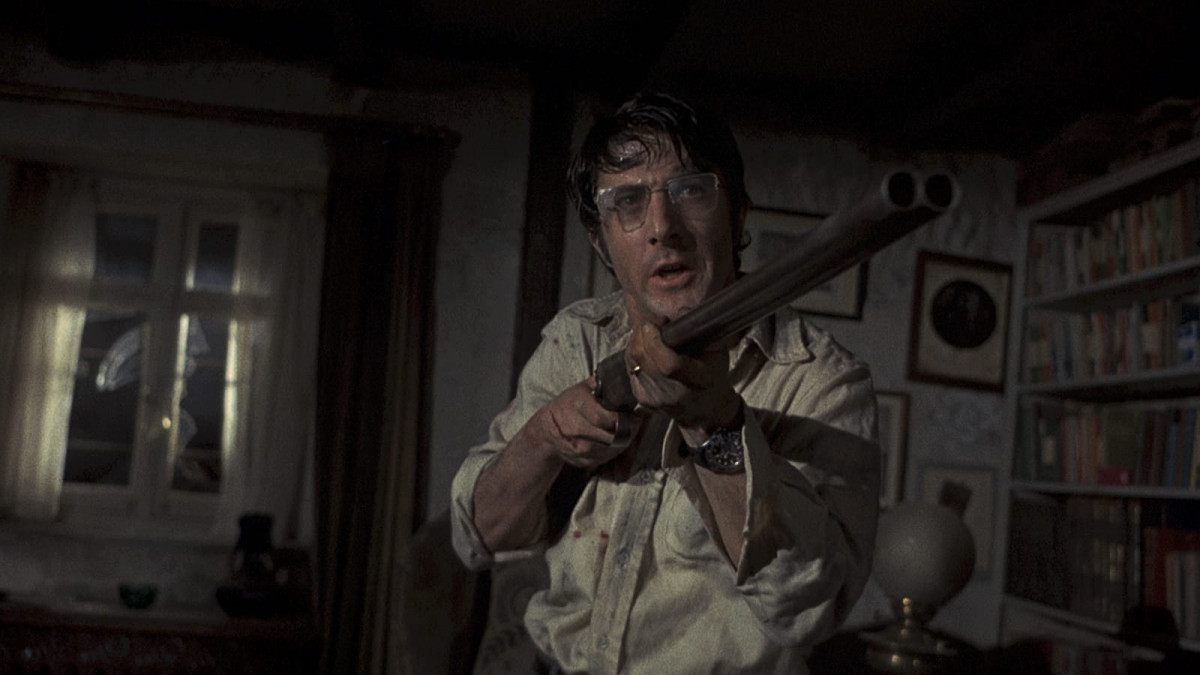
It remains one of my favourite films, and made me a fan of Sam Peckinpah, prompting that sudden realisation as to why his work is so highly acclaimed in modern cinema. And yet it wasn’t his more famous ‘The Wild Bunch’ that courted my fascination with his work. Rather it was this psychological thriller from 1971 that made me pursue more of his catalogue, and fully realise the extent of his genius.
Straw Dogs is an uncompromisingly violent tale of a meek American mathematician named David Sumner, played by the ever reliable, Dustin Hoffman. Sumner and his attractive wife Amy (played by Susan George) relocate to a sleepy English village, where Amy is originally from. Immediately, this sets up a conflict where the locals take a disliking to David and make no secret of their resentment of him. A class structure is established, pitting the more masculine yet boorish locals against the more educated yet physically weaker academic.
There is almost a Peter Parker-esque quality to the way that Hoffman portrays David, like Parker he is intelligent yet somewhat awkward, leading to his overt victimization by the locals. Unfortunately, unlike his Marvel Comics equivalent, Sumner does not possess any super powers nor does he have a powerful heroic alter ego. He is for all intents and purposes, a nerdy beta-male that is forced to embrace the alpha inside him; but it isn’t for ego, nor for proving a point. There is purpose behind his transformation, one that culminates in his powerful statement as his house is about to be besieged by his tormentors:
“I will not allow violence against this house.”
As a character study, it prompts the viewer to examine the film’s purpose and by extension, the genre which would define it. The reclassification of genre is at least in my mind, a talking point and what makes this film so brilliant in its design. Its moodiness, sense of depravity and hopelessness might make it a horror film of sorts; the relationship between David and Amy might make this a character driven drama, and yet the brutal intensity of the film’s climax might make this more of an action film. Yet unlike Bronson’s Paul Kersey in Death Wish or even Willis’ John McClane in Die Hard, Hoffman’s David Sumner is neither capable nor deadly. He is just a man that is pushed to his limits, educated and civilized he has forced to engage his more primal instincts in order to protect his wife.
Where the film succeeds in this development of Sumner is in his ability to engage his wit and intellect to outpace his opponents. As an audience member, we have become so invested in Sumner not simply because he is likeable but moreover it’s our desire to see him get the best of the bullies. It is the same reason we want to see Daniel LaRusso defeat the Cobra Kai in The Karate Kid or Rocky Balboa overcome Ivan Drago in Rocky IV. Though the most unique facet of Sumner, is that he possesses no formal training in combat nor is he subject to the requisite montage that turns him into an unstoppable force. Herein, the opposite applies.
Almost evoking some aspects of Jackie Chan prop usage (minus the comedy), Sumner relies on household items to help him settle the score, whether these be the lethal simplicity of a boiling kettle or the more dastardly window trap he gleefully uses on one of his attackers. The whole concept of vengeance is a commonly effective narrative device in film, yet it seems even more profound when revenge is realized by an unlikely hero.
The relatability of David Sumner, is perhaps why the audience will root for him throughout the whole film and heavily anticipate the moment where he gets his revenge. We want to see Sumner not only assert his own dormant sense of powerful masculinity but use this when it is most important, that is to protect his wife. In many ways, his meek character somewhat masks his true intentions – the house is not just a structure, not as Aussie Daryl Kerrigan would say ‘a man’s castle’ but also the representation of all he holds dear. With his beloved wife already violated by the aggressors, they crossed the line and Sumner would not allow a further mistreatment to occur of his property.
Peckinpah had adapted the story from the novel known as ‘The Siege of Trencher’s Farm’ by Gordon M. Williams, which was published only two years prior to the release of Peckinpah’s movie. Although this journalist has not read this book, the premise is very similar despite the character name changes and the like.
Somewhat surprisingly, an American remake was released back in 2011 and unsurprisingly, it was met with a very tepid, justifiable response. Even the ending was altered to seemingly satiate the whims of a more mainstream audience, and it made for a less impactful final shot unlike the 1971 original. This was reminiscent of Hollywood remaking the groundbreaking film Dutch film The Vanishing and completely ruining it.
Straw Dogs is a movie, that should be viewed not with complete caution but with a sense of wonder and optimism. Despite the horrific subject matter and depressing setting, the movie is a true masterpiece that will besiege your consciousness in the same way Sumner’s attackers besiege his castle. Such an impact will result in repeat viewings and prompt further fascination of this legendary film maker.
Visit Criterion Collection to snag a copy of Straw Dogs (1971) today!
